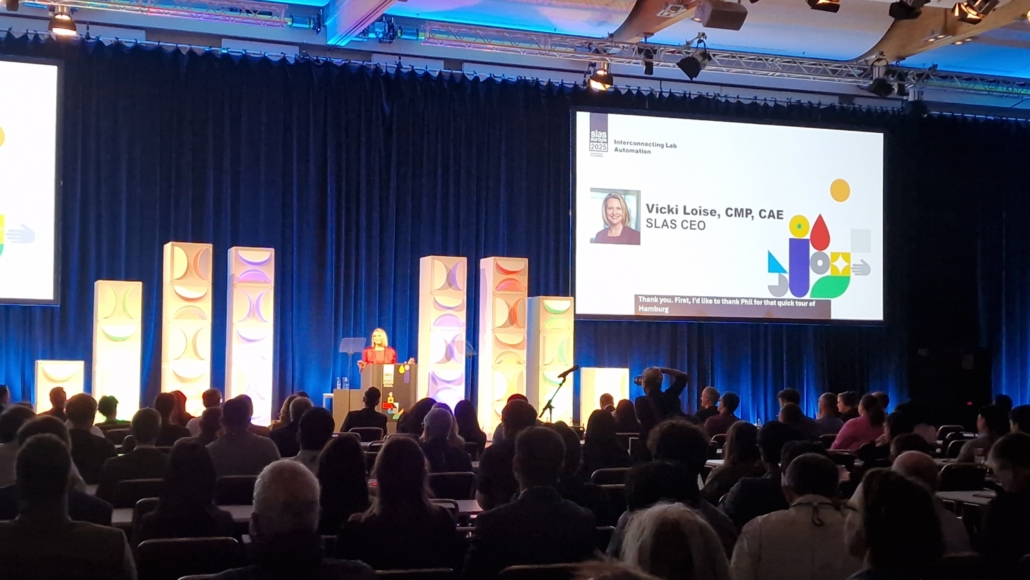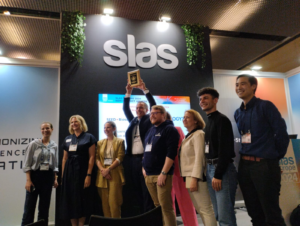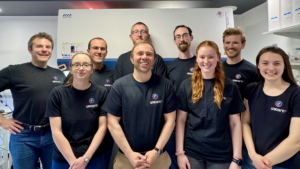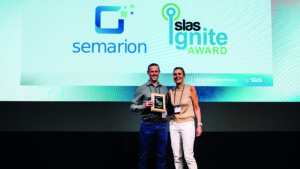
Biopharma transformation: leading drug discovery start-ups of 2025
British company Wildcat Laboratory Solutions Ltd and Hamburg-based mo:re GmbH have received the New Product Award from the Society for Laboratory Automation and Screening (SLAS) in recognition of new technologies with potential to drive industry transformation. The award for the most promising start-up was conferred upon Swiss firm Oryl Photonics SA.
British company Wildcat Laboratory Solutions Ltd and Hamburg-based mo:re GmbH have received the New Product Award from the Society for Laboratory Automation and Screening (SLAS) in recognition of new technologies with potential to drive industry transformation. The award for the most promising start-up was conferred upon Swiss firm Oryl Photonics SA.
Sustainability in laboratory operations, significant reductions in time and cost, and improved reliability in preclinical drug testing were key themes at the 6th SLAS Europe conference held in Hamburg. The event saw a notable 25% increase in exhibitor participation compared to the previous year in Barcelona, with 137 exhibitors against 109 in 2024: Europe’s largest conference trade fair for preclinical drug screening and laboratory robotics is showing strong growth momentum in view of the transformation of the biopharma industry. The need for greater productivity in drug development through the integration of AI, human high-throughput organoid models for preclinical development, phenotypic CRISPR screens and greater interlaboratory reproducibility was reflected at the 6th SLAS Europe in Hamburg in 40 new product presentations, pitches and lectures as well as automation technologies presented by start-ups, including 12 companies selected by SLAS with particularly high innovation potential.
Five companies each made it to the finals for the SLAS Awards, and 12 start-ups made it into the AveNew programme for particularly innovative newcomers to the market.
Swiss company Oryl Photonics SA (Lausanne) came out on top against strong competition from Instromeda Ltd, Acoustofab Ltd, Unicorn Biotechnologies and Phabioc GmbH with a method that makes it possible to investigate the aggregation behaviour and solubility of small molecule drugs and complex biologics 100 times faster than the previous standard HPLC and that needs 10 times less time than SLS/DLS methods, requires only a hundredth or tenth of the sample volume and preserves the sample material for subsequent kinetic or orthogonal measurements. The OrylF1 presented at SLAS Europe 2025 thus helps to significantly accelerate preclinical drug screening and save costs. OrlyF1 uses laser-based dynamic light scattering to measure a 384-well plate in just 15 minutes and has already been sold to pharmaceutical partners. The SLAS Ignite Award, recognising the most innovative start-up in laboratory automation, includes a €5,000 prize. Oryl Photonics, which is one of the 12 start-ups supported under SLAS’s AveNew initiative, also benefits from heightened visibility through the organisation’s media partnership with European Biotechnology Magazine.
This year, the SLAS New Product Award also went to a Hamburg-based firm, to the satisfaction of the regional life sciences cluster organisation Life Sciences Nord (LSN). The Mo:bot system from mo:re GmbH, presented publicly for the first time at SLAS, enables fully automated culture and analysis of human organoids for use in preclinical drug screening.
Managing Director Lukas Gaats, who founded mo:re together with David Hackenberger (CTO), plans to make Mo:bot the ‘gold standard of organoid-based’ drug development. Mo:bot integrates artificial intelligence to allow non-specialists to reproducibly mass-produce four organoid types—heart, brain, liver, and pancreas. The 3D organoids usually simulate in vivo toxicity and efficacy in the human body better than animal models. This promises to reduce the time-consuming and costly high preclinical failure rate of drug candidates during translation into the clinic. Only 10% of preclinical small molecule drug candidates and 15% of monoclonal antibodies and ADCs are successful in clinical trials. Around 50% prove to be ineffective.
‘Our platform of laboratory robots and software replaces animal experiments with AI-supported cultivation of disease models, on which new active substances can be standardised and tested in high-throughput,’ explained Gaats in Hamburg. ‘This enables experiments to be scaled up without compromising traceability and quality in order to close the gap between proof-of-concept and industrial experiments.’
In addition to MO:BOT, the recyclable plastic alternative 2D Tube Racks from Wildcat Laboratory Solutions, which was licensed in March 2025, was honoured with the NewProduct Award, beating the finalists BlutCatBio GmbH, Dispendix GmbH, Sartorius AG and Dunn Labortechnik as well as 35 other product launches at SLAS.
The award-winning product was developed by the US company PulpFixin Inc., which has entered into a sales partnership with Wildcat for marketing in Europe and the UK. PulpFixin markets its suite of 100% compostable, biodegradable, and recyclable lab products-such as AutoRacks™, Cryoboxes, Pipette Tip Racks, and cold-chain transport materials-to reach laboratories across the UK and EU through Wildcat’s well-established distribution network and local expertise.
PulpFixin’s products are lab-tested and automation-ready, engineered to meet the demands of high-throughput environments, including cryogenic storage and automated workflows. Each product is sealed with the company’s proprietary FutureFilm™ technology-offering a fossil fuel-free, moisture-resistant barrier that prevents contamination and supports cleanroom compliance.
Next SLAS Europe conference will take place in Austria’s life sciences capital Vienna from 19. to 21. May 2026. Hamburg will host three further SLAS Europe conferences in 2027, 2029 and 2031.


 SLAS
SLAS Unicorn Biotechnology Ltd.
Unicorn Biotechnology Ltd. SLAS - Alexandra Csuport Photography
SLAS - Alexandra Csuport Photography